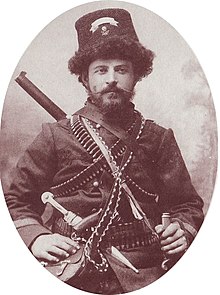| Revision as of 19:43, 9 October 2022 edit95.223.228.121 (talk)No edit summaryTags: Reverted references removed Mobile edit Mobile web edit← Previous edit | Revision as of 19:45, 9 October 2022 edit undo95.223.228.121 (talk) →LegacyTags: Reverted Mobile edit Mobile web editNext edit → | ||
| Line 43: | Line 43: | ||
| ==Legacy== | ==Legacy== | ||
| Pitu Guli is a national hero in ] and ], and remembered as having fought heroically at ] (''Bear's Rock'') near Kruševo, where he was killed during the Ilinden Uprising in defense of the ] ]. A ] Brigade was named after him. He is also celebrated in folk songs and poetry throughout the region of ], being mentioned in the ] of |
Pitu Guli is a national hero in ], and remembered as having fought heroically at ] (''Bear's Rock'') near Kruševo, where he was killed during the Ilinden Uprising in defense of the ] ]. A ] Brigade was named after him. He is also celebrated in folk songs and poetry throughout the region of ], being mentioned in the ] of Macedonia. | ||
| ==References== | ==References== | ||
Revision as of 19:45, 9 October 2022
Aromanian revolutionary in Ottoman Macedonia (1865–1903)| VoyvodaPitu Guli Питу Гули | |
|---|---|
 Pitu Guli in guerilla attire Pitu Guli in guerilla attire | |
| Born | c. 1865 Kruševo, Ottoman Empire (now Republic of Macedonia) |
| Died | 12 August 1903(1903-08-12) (aged 37–38) Kruševo Republic (now Republic of Macedonia) |
| Cause of death | Killed in Action |
| Monuments | Mečkin Kamen |
| Nationality | Aromanian |
| Other names | Pitu the Vlach |
| Occupation | Revolutionary |
| Military career | |
| Allegiance | |
| Service | |
| Years of service | 1885-1903 |
| Battles / wars | Ilinden-Preobrazhenie Uprising |
Pitu Guli (Cyrillic: Питу Гули; 1865–1903) was an Aromanian revolutionary in Ottoman Macedonia, a local leader of what is commonly referred to as the Internal Macedonian Revolutionary Organization (IMRO).
Life
Born to a poor family in Kruševo, he demonstrated an independent and rebellious nature early in life. He left his home in Macedonia at the age of 17 in search of wealth in the Bulgarian capital, Sofia. In 1885, he returned to Macedonia, as part of a rebel squad of the revolutionary movement against the Ottoman Empire, led by Adam Kalmikov. He was captured and exiled to eastern Anatolia for a period of eight years, seven years of which were spent in the prison in Trabzon. In 1895, he again returned to Kruševo and became a member of IMARO. From this time on, he was fully committed to the autonomy of Macedonia from Turkish rule. Between 1897 and 1902 he was again in Sofia, where he also held an eating house.

In March 1903, he began commanding a revolutionary squad, crossing the Bulgarian-Ottoman border heading for Kruševo. From April to August 1903, he trained and prepared his irregulars for the upcoming Ilinden Uprising. He died in Kruševo, defending the Kruševo Republic.
Family
Following the revolt, Romania, with the support of Austro-Hungary, succeeded in the acceptance of the Aromanians ("Vlachs") as a separate millet with the decree (irade) of May 10, 1905 by Sultan Abdul Hamid II, so the Ullah Millet ("Vlach Millet", referring to the Aromanians) could have their own churches and schools. Except for Bulgarian Exarchist Aromanians,<ref>Aromanian consciousness was not developed until the late 19th century, and was influenced by the rise of Romanian national movement. As result, wealthy, urbanized Ottoman Vlachs were culturally hellenised during 17-19th century and some of them bulgarized during the late 19th and early 20th. century. Raymond Detrez, 2014 Pitu is father of Tashko Gulev (Shula Guli), who died in 1913 as soldier of the Bulgarian Army in the battle of Bregalnica against the Serbs, during the Second Balkan War.
Legacy
Pitu Guli is a national hero in North Macedonia, and remembered as having fought heroically at Mečkin Kamen (Bear's Rock) near Kruševo, where he was killed during the Ilinden Uprising in defense of the Macedonian Kruševo Republic. A Macedonian Partisan Brigade was named after him. He is also celebrated in folk songs and poetry throughout the region of Macedonia, being mentioned in the national anthem of Macedonia.
References
- Thede Kahl, Ethnologia Balkanica, Vol. 6 (2002), p. 148